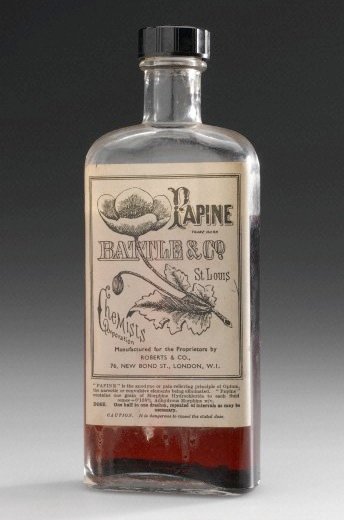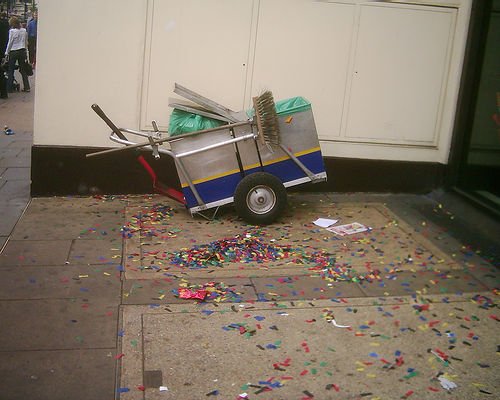It could be worse. I give you… (drumroll please)… the logo for NBC’s official coverage in the States:

Now that is an astonishingly ugly piece of design to come from a major media company.
It could be worse. I give you… (drumroll please)… the logo for NBC’s official coverage in the States:

Now that is an astonishingly ugly piece of design to come from a major media company.
David Nutt became somewhat famous in the UK when he was chairman of the Advisory Council on the Misuse of Drugs [ACMD], the statutory body which is responsible for advising the government on drug policy, and specifically on the appropriate legal classification of different drugs.
He was criticised and eventually fired for being rather too vocal about the fact that the government consistently ignored the advice of the ACMD and allowed political considerations to trump politics, and for pointing out some inconvenient truths about relative harms; that alcohol and tobacco are both more dangerous than many illegal drugs, and that horse-riding is considerably more dangerous than taking ecstasy.

This became a bit of a cause celèbre in the geekosphere. Because we all know that politicians will ignore the evidence if it’s politically inconvenient, but it’s rarely quite so blatant as firing someone for saying what the evidence is.
This book covers various aspects of drug use: how drugs work, how harmful they are, what addiction is, what treatments are available and so on. It covers alcohol, tobacco and prescription drugs as well as the illegal ones.
It’s interesting to read because it simultaneously seems radical and rather obvious. Radical because if all the evidence in the book was taken seriously it would involve a top-to-bottom rewriting of UK drug laws; and obvious because actually not much of this stuff should come as a surprise.
For example, however much politicians may splutter about the comparison, can anyone who lives in this country seriously doubt that alcohol causes far more social harm than ecstasy or cannabis? Or that, purely pragmatically, treating addiction as a medical problem is likely to be more successful than treating it as a moral failing? And even if you think cannabis should be illegal, surely it makes intuitive sense that it is counterproductive to imprison users: both because being in prison is in itself more damaging to the individual’s future prospects than the actual drug use, and because it is very expensive to lock people up.
It’s interesting though, and very readable. It helps that, although the book takes a ‘liberal’ stance compared to the current law, it’s not derived from a naive libertarianism. Nutt is not arguing for loosening the drug laws on the basis of increased personal liberty; he wants the law to be better at managing harms and risks. So he supports the ban on smoking in public places and would tighten some of the rules on alcohol sales. And although treating addiction to heroin and cocaine as a primarily medical problem could be seen as ‘soft on drugs’, he’s arguing for it on the basis that it is the best way to minimise harm.

A few random interesting points from the book: he points out that coca leaves, cocaine and crack are all pharmacologically the same substance, and that the method of delivery makes a huge difference not just to the experience but also the addictiveness. I was startled to learn that about 500 people a year die of heroin overdoses after coming out of prison because, having stopped or reduced their use while inside, they have lost the tolerance they used to have.
And I was struck by his suggestion that the duty on alcoholic drinks should be proportional to actual alcohol content, rather than by category with one rate for beer and one for wine and so on. That would be a direct incentive for drinkers to switch to weaker drinks and for manufacturers to reverse the trend of beers and wines getting stronger. Which seems sensible. There a general argument for making alcohol more expensive anyway, but it seems like a good start to make Special Brew considerably more expensive than lagers with less than half the alcohol.
» The Pink Elephants on Parade LSD blotter is from the Blotter Art website. The bottle of Papine is from Wellcome Images and used under a CC by-nc-nd licence.
After the credit crunch, it was very natural to think that surely someone somewhere ought to be punished for what happened.
But I was open to the argument that what had happened was a combination of incompetence, greed, systemic failure and macro-economic forces, rather than actual fraud — or at least that fraud was a small part of the story. And so it was not a matter for the criminal law.
And then this Barclays case comes along. And we have what, as far as I understand it, is a straightforward case of people conspiring to lie about important financial information in order to manipulate the market… and still no one is apparently facing criminal prosecution.
It’s not just that it would be satisfying to see a few City wide boys up before a judge. It’s that it makes you wonder how much other potential criminality has been left uninvestigated or unprosecuted for some reason. Because it’s easier to let sleeping dogs lie? Because fraud cases are expensive to investigate and prosecute? Because the authorities are still so worried about the fragility of the financial system that they’re scared of rocking the boat? Because of the same combination of cosiness and intimidation that stopped the police from investigating phone hacking properly?
The whole thing stinks.
Tax avoidance/evasion is in the news again, and once again I find my mind drifting back to that book Treasure Islands, which I read a year ago and stuck with me since. Because a lot of these issues of tax policy are inevitably messy and complicated, both ethically and as a matter of pragmatic policy; but there is one particular point I keep returning to.

Which is this: when you think about it, it’s a bit weird that tax havens are allowed to exist. Because all those ‘companies’ which are just a pigeonhole in a lawyer’s office in the Cayman Islands? The only reason they exist is for the explicit purpose of escaping the laws and regulations of another country.
That’s not intended to be a rhetorical flourish; it is, as far as I can tell, a simple statement of fact.
If a company does its business in the UK but has part of its corporate structure registered in the Cayman Islands*: they are trying to avoid laws passed by a legitimate democratic government. To get pompous for a moment, they are rejecting the democratically expressed will of the British people.
They might be doing it to avoid tax, they might be looking for lax financial regulation, they might be trying to disguise corporate fraud or launder the proceeds of organised crime. All you know for certain is that they intend to avoid the law.
So why do we put up with this crap? The Caymans, the British Virgin Islands, the Turks and Caicos, Jersey, Bermuda, Guernsey, the Isle of Man, Luxembourg: it’s not a list of great global powers that we need to tread carefully around because of their terrifying military and economic influence.
The EU and the US could simply† refuse to recognise the legal validity of companies and trusts registered in these countries. No doubt clever accountants and lawyers would still find ways to avoid paying tax, and to launder money, including of course the most direct way of avoiding tax: lobbying politicians to change the tax code in your favour. But I don’t see why we should make it any easier for them than necessary.
* or a trust in the Turks and Caicos, or Guernsey, or whatever it might be.
† Well, OK, it might not actually be ‘simple’. But I’m sure we could come up with something.
From the beginning I’ve said that, although I was excited about London getting the Olympics, one particular worry was that the opening ceremony would be cheesy, amateurish or otherwise rubbish. We ought to be able to do it — there are plenty of people in the UK with expertise in putting on a show, whether it’s a West End musical, a pop concert or a Harry Potter film — but recent examples like Euro 96 or the Commonwealth Games have not been encouraging.

Well, the first details have been released. The ceremony is going to open with a recreation of the British countryside, with real grass, real trees, real farm animals, tractors, cricket being played, a recreation of Glastonbury Tor, and two ‘mosh pits’, one to represent Glastonbury Festival and one for the last night of the Proms.
So what do I think? I guess I’m cautiously positive. It’s an idea which, if it’s done well, could be impressive and memorable without trying to compete with Beijing for sheer megaspectacle. It could be a bit twee, but it could also be fun.
But that cautious enthusiasm is subject to the assumption that what they’ve told us so far is not the full story. I’m all in favour of warm beer, sheepdogs and cricket, but it would be very weird, in the 21st century, to present the UK as a rural idyll. There has to be some kind of indication that we are an urban, multicultural, modern nation. The games are being held in east London, not the Cotswolds: we don’t want a Midsomer Murders opening ceremony, whitewashed for the sake of cosy nostalgia.
But I think the organisers know that. So let’s trust that they have a few surprises up their sleeve.
The day after London won the right to host the Olympics was the day of the 7/7 bombings, and I always felt we were cheated of a chance to enjoy the moment.
The news of the attacks rightly took precedence over pictures of Jacques Rogge opening an envelope. The violent deaths of ordinary Londoners, the grief, trauma and fear as well as the politics: those were more important.

But still, it was an immediate cold shower on what could have been a moment of optimism, joy and excitement. No one was in the mood to celebrate.
And ever since, I’ve been trying to hold on to the anticipation and enthusiasm that I felt when we first won the bid. It hasn’t always been easy.
There’s the logo which, despite all my best attempts, I have not come to love. There was the chaos of the ticketing. The hectoring posters telling people to stay at home during the Games to reduce pressure on the transport network. The aggressive brand management that’s too humourless to let local bakers make iced buns decorated with the Olympic rings. The Ministry of Defence turning up unannounced to mount anti-aircraft defences on peoples’ houses. The ludicrous corporate tie-ins: ‘official cereal snack bar supplier of London 2012’. The fact that the Olympic park is going to contain perhaps the most depressing-sounding building imaginable: the world’s largest McDonalds.
Above all, perhaps, there’s the sheer cost of the thing. Because the financial crash, the subsequent government cuts and the continuing crappy economy make it harder than ever to be glib about the idea of spending billions of pounds on a fortnight’s sport.
The thing is, though, that even though all those criticisms are fair — in fact, especially because those criticisms are fair — I just find myself wanting to say ‘Look, we’re committed to it now, it’s going to happen, please can you stop spoiling it for me. Please can you just let me enjoy it.’ And I’ve nearly unfollowed a couple of people on Twitter because whenever I’m scrolling through and I see their stern, hard-headed comments about the Olympics, it makes me die a little inside. Pathetic, I know.
Bread and circuses. Those Romans knew what they were doing.
» The picture of detritus in Trafalgar Square, from the celebration of London winning the bid on 6th July 2005, is © Ben Sutherland and used under a CC attribution licence.